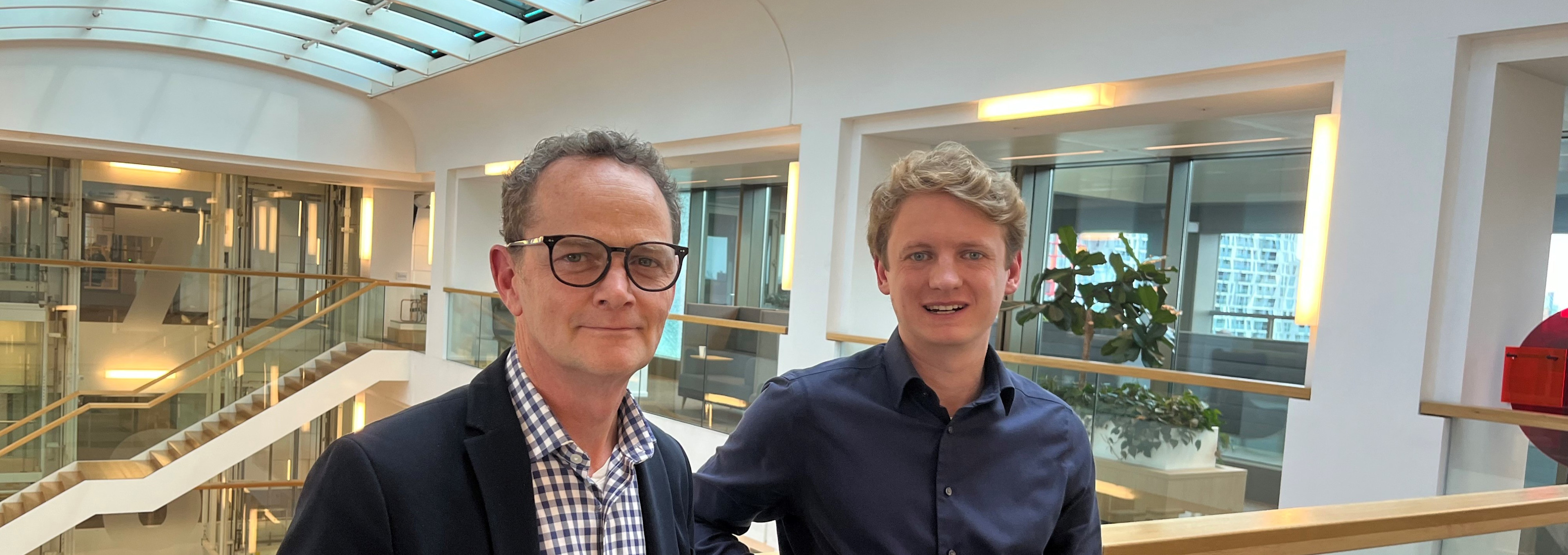

Podcast: The three big trends shaping our future
What does it take to truly see the significant shifts taking place in the world around us – those structural themes that might be obscured by the noise, but which require investors’ attention? Daniel Ernst and Sam Brasser are passionate about watching the world, discerning persistent themes and forming views on how to construct portfolios to benefit from them. Tune in to our latest podcast episode.
Tune in now – Robeco podcasts
Transcript
This podcast is for professional investors only.
Sam Brasser (SB): If you start all the way from the top, we have three big themes: Transforming Technology, Changing Sociodemographics, and Preserving the Earth.
Daniel Ernst (DE): For this summer's collection of daily sketches, we did something slightly different. We collaborated with our multi-thematic investment strategy team to organize the 15 sketches into the three big themes that we track at Robeco that Sam mentioned.
Welcome to a new episode of the Robeco podcast.
Erika van der Merwe (EM): What does it take to truly see the significant shifts taking place in the world around us? Those structural themes that might be obscured by the noise, but which require investors attention. My guests are from Robeco’s Thematic Equities team, and they are passionate about watching the world discerning persistent themes and forming views on how to construct portfolios to benefit from these themes. Daniel Ernst is a portfolio manager and Sam Brasser is an analyst and researcher in the team. Welcome both.
SB and DE: Thank you very much.
EM: I've had a look, you’re part of a team of about 50 analysts and portfolio managers covering more than a dozen investment themes. So that's from fashion to water and from biodiversity to fintech and many more interesting topics in between. How different is your world from traditional equity investing, which I'd imagine is far more diversified, covering most sectors, where you’re just taking a slice and dice, if you look at your daily process.
DE: Actually I wouldn't say that it's narrow, it's actually quite broad. So really at the core of what we do, as the Greek philosopher Heraclitus noticed, is that the only constant in life is change. And so at the root of what we do in thematic investing is look for change around the world. Understand what's causing that change. What are the drivers? What is the rate of change? And ultimately, as investors, we're looking for companies that can take advantage of the opportunities that arise from that process. And so what we do is any given trend is going to have some subcomponent that's moving. And that's one of the reasons why Sam and I created the Daily Sketch, to kind of document that change. So if we have a view that e-commerce is a theme that will continue, then we should look for evidence that either supports that idea or refutes it. The Daily Sketch is kind of an outgrowth or a byproduct of that research process. And then that research process might support a company investment case. So we're looking at a company and we say okay here are the trends that are happening, under the surface, and those will continue or they're not continuing. So this is a theme that we think will continue for a while. And then we want to understand all the different moving parts. So all these sketches that we do every day, are part of that research process for understanding the themes that we're covering, the companies that we might invest in, and it helps us to also explain it not just to ourselves in that research process, but we can also share those views with our prospective investors.
EM: So I'm going to pick up on the Daily Sketch in a minute. But interesting that you referred to that quote from a Greek philosopher, because not too long ago we spoke to your colleagues, Jack Neele and Roman Bonar. Interestingly, when I asked them about their daily lives, they also quoted that and they said the only constant is change. Every workday is different. And that's of course super exciting, but the risk is it's so busy, it's so changeable that you kind of lose track of what's important. So, Sam, exactly what Dan’s saying, presumably you need a very clear filter and framework. So it's more than the Daily Sketch, of course, the Daily Sketch is an outgrowth of that. So how would you describe that framework, that very clear framework that keeps you on the path of that trend?
SB: If you start all the way from the top, we have three big themes: Transforming Technology, Changing Sociodemographics, and Preserving the Earth. And you can have many, many subthemes under those like three big changes. And that helps to categorize those themes, categorize the companies you're looking at, and then you can look at, you basically go from the top and then you filter down to smaller and smaller themes until you find very interesting ones that you can also invest in, that drive the companies and drive industries.
EM: Now the Daily Sketch, how long has that been running for? Because I am a subscriber and it's always fantastic. You know you're in the midst of something, and then this email pops up with sometimes hilarious titles, witty, some puns. How long have you been running this and what does the process look like?
SB: A bit more than three years, I think.
DE: The process is dynamic. As I said, it really is a function of the research that we do in investments, and so, many times the sketches come to us. We’re investigating a company and we want to understand the market that it serves. And so I naturally will want to look at the economy around that. So if it's something in an emerging market, we want to understand the economy and people and demographics in that market. We want to understand if the company is selling semiconductors, into what sub-industry. Maybe it's automotive or it's industry, or it's just PCs and mobile phones. We want to understand the sales growth of each of those components. And we'll look for data that helps us understand that market. So sometimes it's a very directed process. We're working on a company or a new research team and we'll look for it. And sometimes it just, I mean, we're naturally curious people, so as a New Yorker, I still get up at 5.30 in the morning and I'm reading through the FT and Bloomberg and different trade and technology magazines, and I just get ideas. And in that process, I bookmark various things that might make an interesting sketch, I want to understand that better. Then we go look for the data.
EM: So that's typically a chart that you build your story around, in about three, 300 words or so.
SB: Yeah, and I think we're now above the 700 sketch, like 725. So we've been adding for a while and indeed it's a chart with 125-150 words to just put it into context. And now that we've been running it for a while, we can get back to something we looked at two years ago and the data has been updated, and now you can check it again. Is it still what we thought back then? Is it still valid? Has something changed, etc. So I think that buildup or the kind of muscle that we have trained becomes more effective. And that's super interesting. For instance, we had a sketch recently, I did one about pets and pet population increased a lot during the pandemic. And some thought that will continue, and now we actually see it stabilizing, in the US we have the best data, we see it stabilizing. So that begs the question: this pet trend, is it still valid? What are consumers doing? Is it as strong? Now we see that the pet population is relatively stable. But we also see for example, and that's very niche, I track shelter data, like how many cats or dogs are admitted to shelters, etc. And there you can see it has actually not increased that much. So people are keeping their pets and not bringing them to the shelter, that they acquired during Covid. But spending per pet, for instance, is increasing. It's nice to come back to those trends every now and then.
EM: I can always tell you have fun, because the title of that sketch was ‘Pet pause’. Another one was ‘Chip aid’ on government support for the semiconductor sector. What were your findings there?
DE: The semiconductor one was kind of interesting, right? Because this is a for-profit sector. And so it's not one that you would expect to need aid. But it is part of a process that I will discuss when we get into the summer booklet a bit more, but obviously geopolitical concerns, complexities of supply chains, have made companies and governments kind of rethink the current order of how chips are fabricated. So there's an increased interest in bringing more chip plants into national boundaries. So that was kind of the focus of that research that made it also made an interesting graph.
EM: And there was the ‘The hopeful 493’. I love this title, what it’s about?
DE: I cover tech stocks, which makes me a focal point for the Magnificent Seven. The narrative always has been that the other 493 are still here and still important parts of the market. So how are they doing? And that was kind of interesting because over the last 2 or 3 years, the Magnificent Seven have indeed grown significantly faster, not just their stock prices, but their earnings growth has been significantly faster, and any growth rate is going to have a trouble in the second derivative. Eventually, it doesn't grow at the same rate that it was, whereas the rest of the market perhaps is more steady. In that graph, we noted that starting in the back half of this calendar year, the growth rate of the hopeful 493 will begin to catch up with the seven companies.
SB: I think it's also good to, obviously these companies, the Magnificent Seven have done very, very well both in share price and obviously in revenue profit growth. But it doesn't stop there. There's always companies, even in the 493 or if you look outside the US, that also have impressive growth and that have performed very well. We are invested for instance, in the obesity diabetes space. Those companies have delivered a lot of growth and their share prices have also gone up tremendously. So the Mag 7 for me is not an excuse to stop looking obviously outside their space.
EM: That’s a good point, right now, when everyone's worrying about the valuations of these stocks. And can they go further? Where will you be this summer, Sam? What will you be reading? Because I believe you have just published your annual summer read, which is a compilation of these daily sketches. What can readers expect?
SB: Readers can expect a nice a pick-and-choose of about 15 sketches from the three big themes that I mentioned. And it I think it picks from the last half year, from the top of my head, and I chose one specifically actually for this podcast on ultra-processed food, which is a topic within Changing Sociodemographics. And there's been really interesting research from a Brazilian scientist, he kind of kickstarted this space, that many countries or many consumers in countries have really increased how much ultra-processed foods they are eating as part of their diet. So for instance, in the US it's estimated that about 55% of total food intake is ultra-processed. And there is a correlation between ultra-processed foods and also obesity rates, for instance, and other health metrics like cardiovascular disease. This is not perfect. For instance, in Japan, about 40% of food intake is from ultra-processed food, but the obesity rate is quite low, so it's only 4%, the obesity rate in Japan and in the US that's 42% with 55% ultra-processed food intake. So it's not causality but it's a correlation. And it's interesting because I was meeting with one of the largest multinationals in the food space, two weeks ago. And I also asked them this question: what are your thoughts around the debate on the ultra-processed food? Because you could say that they sell a lot of a lot of this, and they came up with, ‘yeah but it's not really well- defined and we are working on improving the nutritional value of our products’, etc. And actually so far the pushback from consumers, at least what we see, has not been it's not been that big. Some of them are very vocal, but I think there's also sometimes a bit of a think-act gap that people think they want to eat more healthy or more sustainable, but then in reality, the acts say something different.
EM: And the companies are resisting. So Dan, Sam’s spoken now an example from changing demographics, which is very much along the lines of the areas that he's researching. You say you're on the tech side. So on the Transforming Technology side, what would be your favorite extract from the annual summer read?
DE: Today, the focus is so much on AI, which is clearly a trend and we've published quite a number of graphics on that theme. But the trend that I would highlight is a bit boring. We did a chart, that's in the booklet, on robotic installations or industrial robots. And that's a space that has grown very steadily. They've had a ten-year compound annual growth rate of 14%. It hasn't moved much in and around that, but if you look at it, as I mentioned, relative to semiconductors, geopolitical risks, the cost of maintaining these very long and complex supply chains and aging workforce, you you can understand the rationale for increased calls for reshoring and near-shoring. And these new manufacturing facilities are increasingly automated and with high concentrations of industrial robots. So this is a theme that we expect will have a very long runway. So it was a bit of a boring, ‘straight up into the right’ chart, but it's one that really does support the theme as an investment.
EM: Well, I looked at the third theme, Preserving Earth, and in this case, it's a chart that's boring, straight down to the right, it was called ‘Shining Bright’, and it's based on a chart showing the solar spot price index, which I see as a non-expert, continues to reach new all time lows thanks to overcapacity in production in China. It speaks to what we see, the geopolitical tensions between East and West, which ultimately is really just economic tension and competition. And we see another example here of many sectors related to clean energy being so reliant. The West is so reliant on China to make this happen, to make the energy transition happen. Despite the political tensions, there needs to be cooperation, right?
SB: It's a tough one, because on the one hand we are looking to make our economy more sustainable. And obviously solar is a part of that, with the renewable electricity and the cheapest solar panels, you can buy them from China. I'm not an expert in this space, but from what I understood is that a decade or one-and-a-half decades ago, Europe had quite a vibrant solar panel production industry. And that has been competed away, I believe, by China. So on the one hand you can say, well, we want to have these kind of enablers of a sustainable economy like solar etc., at a low price. But on the other hand, do we want to be dependent for that on China? Because at some point you also have to replace these things or you have to upgrade, etc. So then that could be a difficult geopolitical position.
EM: Good point. So you've referred to these three major trends or megatrends: Transforming Technology, Changing Sociodemographics and Preserving the Earth. I'm going to test your knowledge on this domain, on this area. I've done some more homework and here you will hear a compilation of voices from this world of yours. I want you to listen. You might need to take notes or type up, because they're going to be a few voices. I want you to listen and then tell me whose voices you heard. And then why do you think there might be included? In other words, to which major theme do they refer?
DE: I'll pass.
EM: You can't.
Voice fragments: I think it's a very healthy and very competitive situation, and one that's honestly good for society, because it is about helping people living with obesity and making them stay active in the workforce and prevent diseases that follows obesity.
You're selling your houses. You say you don't want any material possessions. And having seen all that, I've been really excited to talk to you about this.
I think possessions kind of weigh you down. They're kind of an attack factor. You know, he'll say: hey billionaire, you got all this stuff. Well, now I don't have stuff, now what are you going to do?
We're about to go on a little adventure together. And that adventure is going to span 17 years of music.
I stand here as one of you, a representative of the people. I came to you with the greeting of 1.25 billion people of a nation.
It seems like I'm having so many new feelings that I don't think I've ever been felt before.
People think we make GPUs and we do, but GPUs don't look the way they used to. This is the most advanced GPU in the world in production today.
I can only retire once the world has been saved.
EM: Well, there you have it. Seven voices, I believe. Any ideas?
DE: Jensen was the obvious one discussing the GPU. He is the CEO and founder of Nvidia, so that was an easy one.
EM: That was second last. Okay, obviously.
SB: The first one was the Novo Nordisk CEO, I think. Talk about obesity, treatments. They are there together with another company, the leaders in that.
EM: And that touches on, is that technology or sociodemographics, in your thematic perspective?
SB: I think it's not digital technology obviously, but what these companies have done is a breakthrough for sure in technology, but they address a big social demographic problem of obesity, obviously. And also by the way diabetes.
EM: Right. Any other familiar voices?
DE: Oh, I definitely heard Scarlett Johansson.
EM: The real Scarlett Johansson.
DE: Yes, who played an AI assistant in the movie ‘Her’. So that one was also a bit obvious, and I think you had, not a company leader but a country leader in Modi, discussing the rise of the, I think we did a sketch on this that, India surpassed China as the largest most populous country in the world, I think last year.
SB: And there was also Joe Rogan in a discussion with Elon Musk, about Elon wanting to sell his possessions. And that ties into an interesting theme, which is goods versus experiences or products versus experiences. Obviously in Covid, we've seen a huge boom in spending on goods and now we see it trending more back to experience. And I think actually experiences is a long-term theme because, maybe also younger generations, they are less tied to possessions, but for them, a great holiday can be a great experience.
EM: Or a concert. Who was the third choice?
SB: Was it Taylor Swift?
EM: Yes.
SB: Tailor Swift is funny because she was even mentioned in some of the Fed meeting notes.
DE: I did a sketch on that.
SB: As in boosting the economy of, I don't know which state it was then, but at least a regional economy in the US.
EM: Well done. So that was six of the seven that you've identified. Did you recognize the last voice, the female voice? Well, I'll tell you, it was Jane Goodall, chimpanzee expert and activist, so on the Preserving the Earth theme. Well done. And just to mention the credits: credits to Nvidia, YouTube, CNBC, The Joe Rogan Show, The Jane Goodall Institute, and ABC news. So one of the three themes, as we've discussed, is Transforming Technology. A really powerful theme, we saw it taking more shape during the Covid era, since then further changes and then of course generative AI taking it to new levels. So how do you expect the AI theme to play out over the, let's say, next 20 years? Will it eventually become so embedded in the way that the internet has, right, that it's so embedded in what we do/see/consume that it's no longer a thing, an entity in its own right?
DE: Actually, I just published a white paper on AI and how we approach it from a thematic standpoint. And so I do think AI is a big theme. There is, however, a tremendous amount of hype in that space. And so, you always have to be a bit cautious when the hype or potentially in the short run outruns. As Roy O'Mara, the Stanford University professor, said, we tend to overestimate the technology in the short run, but underestimate it in the long run. And I think that clearly applies in this case, but I think it is a real technology. As we've seen in past technology cycles, whether it was the mainframe, the PC era, the mobile era, the internet era, the beneficiaries of that tend to be a select few. And I think more than a third of companies in the S&P 500 were discussing AI on their earnings call. So I don't think there's 180 or so companies that have a material benefit from AI at this juncture. So something to watch out for. But it is a real technology. It is going to play out. But, you know, I think it's also kind of in still the early days.
EM: And Sam, how will AI play out within your world of investing, how you use it?
SB: What we use it for, it's a sub-technology, you could classify it under AI, is a natural language processing. And what it basically does is the computer reads documents, analyst goals, etc., and how we specifically apply it is that we extract themes from those documents, earnings calls. So we try to pick up on especially smaller, niche themes that are starting out. So it helps with the identifying new themes.
EM: Fantastic. So good to hear from you. How could listeners get hold of the Daily Sketch and how can they find your summer read?
SB: For the Daily Sketch, you can subscribe on our website. So if you google our Daily Sketch, you'll definitely find it u there.
EM: The top end of the first page of the Google results.
SB: Yes, the last time we checked.
EM: Well done. Thank you guys for joining us, Sam and Dan.
DE and SB: Thank you.
EM: To listeners, thanks for being here with us. Check out the full podcast series. We publish a new episode every month covering a range of investment-related topics. If you subscribe, you’ll receive a notification as soon as the new episode is published. In the meantime, please rate the show and share the show link with a friend. This monthly podcast and Robeco’s bi-weekly podcast, In tune with the markets, are both available on all major podcast platforms and on the Robeco website. Until next time.
Thanks for joining this Robeco podcast. Please tune in next time as well. Important information. This publication is intended for professional investors. The podcast was brought to you by Robeco and in the US by Robeco Institutional Asset Management US Inc, a Delaware corporation as well as an investment advisor registered with the US Securities and Exchange Commission. Robeco Institutional Asset Management US is a wholly owned subsidiary of ORIX Corporation Europe N.V., a Dutch investment management firm located in Rotterdam, the Netherlands. Robeco Institutional Asset Management B.V. has a license as manager of UCITS and AIFS for the Netherlands Authority for the Financial Markets in Amsterdam.
Important information
The contents of this document have not been reviewed by the Securities and Futures Commission ("SFC") in Hong Kong. If you are in any doubt about any of the contents of this document, you should obtain independent professional advice. This document has been distributed by Robeco Hong Kong Limited (‘Robeco’). Robeco is regulated by the SFC in Hong Kong. This document has been prepared on a confidential basis solely for the recipient and is for information purposes only. Any reproduction or distribution of this documentation, in whole or in part, or the disclosure of its contents, without the prior written consent of Robeco, is prohibited. By accepting this documentation, the recipient agrees to the foregoing This document is intended to provide the reader with information on Robeco’s specific capabilities, but does not constitute a recommendation to buy or sell certain securities or investment products. Investment decisions should only be based on the relevant prospectus and on thorough financial, fiscal and legal advice. Please refer to the relevant offering documents for details including the risk factors before making any investment decisions. The contents of this document are based upon sources of information believed to be reliable. This document is not intended for distribution to or use by any person or entity in any jurisdiction or country where such distribution or use would be contrary to local law or regulation. Investment Involves risks. Historical returns are provided for illustrative purposes only and do not necessarily reflect Robeco’s expectations for the future. The value of your investments may fluctuate. Past performance is no indication of current or future performance.
























